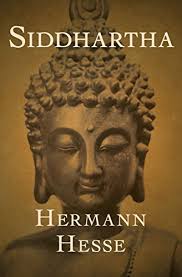Siddhartha Page #6
Siddhartha is a novel by Hermann Hesse that deals with the spiritual journey of self-discovery of a man named Siddhartha during the time of the Gautama Buddha. The book, Hesse's ninth novel, was written in German, in a simple, lyrical style.
This made Govinda happy, and full of joy he exclaimed: "Well so, thus we have reached our destination, and our path has come to an end! But tell us, oh mother of the pilgrims, do you know him, the Buddha, have you seen him with your own eyes?" Quoth the woman: "Many times I have seen him, the exalted one. On many days, I have seen him, walking through the alleys in silence, wearing his yellow cloak, presenting his alms-dish in silence at the doors of the houses, leaving with a filled dish." Delightedly, Govinda listened and wanted to ask and hear much more. But Siddhartha urged him to walk on. They thanked and left and hardly had to ask for directions, for rather many pilgrims and monks as well from Gotama's community were on their way to the Jetavana. And since they reached it at night, there were constant arrivals, shouts, and talk of those who sought shelter and got it. The two Samanas, accustomed to life in the forest, found quickly and without making any noise a place to stay and rested there until the morning. At sunrise, they saw with astonishment what a large crowd of believers and curious people had spent the night here. On all paths of the marvellous grove, monks walked in yellow robes, under the trees they sat here and there, in deep contemplation--or in a conversation about spiritual matters, the shady gardens looked like a city, full of people, bustling like bees. The majority of the monks went out with their alms-dish, to collect food in town for their lunch, the only meal of the day. The Buddha himself, the enlightened one, was also in the habit of taking this walk to beg in the morning. Siddhartha saw him, and he instantly recognised him, as if a god had pointed him out to him. He saw him, a simple man in a yellow robe, bearing the alms-dish in his hand, walking silently. "Look here!" Siddhartha said quietly to Govinda. "This one is the Buddha." Attentively, Govinda looked at the monk in the yellow robe, who seemed to be in no way different from the hundreds of other monks. And soon, Govinda also realized: This is the one. And they followed him and observed him. The Buddha went on his way, modestly and deep in his thoughts, his calm face was neither happy nor sad, it seemed to smile quietly and inwardly. With a hidden smile, quiet, calm, somewhat resembling a healthy child, the Buddha walked, wore the robe and placed his feet just as all of his monks did, according to a precise rule. But his face and his walk, his quietly lowered glance, his quietly dangling hand and even every finger of his quietly dangling hand expressed peace, expressed perfection, did not search, did not imitate, breathed softly in an unwhithering calm, in an unwhithering light, an untouchable peace. Thus Gotama walked towards the town, to collect alms, and the two Samanas recognised him solely by the perfection of his calm, by the quietness of his appearance, in which there was no searching, no desire, no imitation, no effort to be seen, only light and peace. "Today, we'll hear the teachings from his mouth." said Govinda. Siddhartha did not answer. He felt little curiosity for the teachings, he did not believe that they would teach him anything new, but he had, just as Govinda had, heard the contents of this Buddha's teachings again and again, though these reports only represented second- or third-hand information. But attentively he looked at Gotama's head, his shoulders, his feet, his quietly dangling hand, and it seemed to him as if every joint of every finger of this hand was of these teachings, spoke of, breathed of, exhaled the fragrant of, glistened of truth. This man, this Buddha was truthful down to the gesture of his last finger. This man was holy. Never before, Siddhartha had venerated a person so much, never before he had loved a person as much as this one. They both followed the Buddha until they reached the town and then returned in silence, for they themselves intended to abstain from on this day. They saw Gotama returning--what he ate could not even have satisfied a bird's appetite, and they saw him retiring into the shade of the mango-trees. But in the evening, when the heat cooled down and everyone in the camp started to bustle about and gathered around, they heard the Buddha teaching. They heard his voice, and it was also perfected, was of perfect calmness, was full of peace. Gotama taught the teachings of suffering, of the origin of suffering, of the way to relieve suffering. Calmly and clearly his quiet speech flowed on. Suffering was life, full of suffering was the world, but salvation from suffering had been found: salvation was obtained by him who would walk the path of the Buddha. With a soft, yet firm voice the exalted one spoke, taught the four main doctrines, taught the eightfold path, patiently he went the usual path of the teachings, of the examples, of the repetitions, brightly and quietly his voice hovered over the listeners, like a light, like a starry sky. When the Buddha--night had already fallen--ended his speech, many a pilgrim stepped forward and asked to accepted into the community, sought refuge in the teachings. And Gotama accepted them by speaking: "You have heard the teachings well, it has come to you well. Thus join us and walk in holiness, to put an end to all suffering." Behold, then Govinda, the shy one, also stepped forward and spoke: "I also take my refuge in the exalted one and his teachings," and he asked to accepted into the community of his disciples and was accepted. Right afterwards, when the Buddha had retired for the night, Govinda turned to Siddhartha and spoke eagerly: "Siddhartha, it is not my place to scold you. We have both heard the exalted one, we have both perceived the teachings. Govinda has heard the teachings, he has taken refuge in it. But you, my honoured friend, don't you also want to walk the path of salvation? Would you want to hesitate, do you want to wait any longer?" Siddhartha awakened as if he had been asleep, when he heard Govinda's words. For a long time, he looked into Govinda's face. Then he spoke quietly, in a voice without mockery: "Govinda, my friend, now you have taken this step, now you have chosen this path. Always, oh Govinda, you've been my friend, you've always walked one step behind me. Often I have thought: Won't Govinda for once also take a step by himself, without me, out of his own soul? Behold, now you've turned into a man and are choosing your path for yourself. I wish that you would go it up to its end, oh my friend, that you shall find salvation!" Govinda, not completely understanding it yet, repeated his question in an impatient tone: "Speak up, I beg you, my dear! Tell me, since it could not be any other way, that you also, my learned friend, will take your refuge with the exalted Buddha!"
Translation
Translate and read this book in other languages:
Select another language:
- - Select -
- 简体中文 (Chinese - Simplified)
- 繁體中文 (Chinese - Traditional)
- Español (Spanish)
- Esperanto (Esperanto)
- 日本語 (Japanese)
- Português (Portuguese)
- Deutsch (German)
- العربية (Arabic)
- Français (French)
- Русский (Russian)
- ಕನ್ನಡ (Kannada)
- 한국어 (Korean)
- עברית (Hebrew)
- Gaeilge (Irish)
- Українська (Ukrainian)
- اردو (Urdu)
- Magyar (Hungarian)
- मानक हिन्दी (Hindi)
- Indonesia (Indonesian)
- Italiano (Italian)
- தமிழ் (Tamil)
- Türkçe (Turkish)
- తెలుగు (Telugu)
- ภาษาไทย (Thai)
- Tiếng Việt (Vietnamese)
- Čeština (Czech)
- Polski (Polish)
- Bahasa Indonesia (Indonesian)
- Românește (Romanian)
- Nederlands (Dutch)
- Ελληνικά (Greek)
- Latinum (Latin)
- Svenska (Swedish)
- Dansk (Danish)
- Suomi (Finnish)
- فارسی (Persian)
- ייִדיש (Yiddish)
- հայերեն (Armenian)
- Norsk (Norwegian)
- English (English)
Citation
Use the citation below to add this book to your bibliography:
Style:MLAChicagoAPA
"Siddhartha Books." Literature.com. STANDS4 LLC, 2024. Web. 22 Dec. 2024. <https://www.literature.com/book/siddhartha_24>.




Discuss this Siddhartha book with the community:
Report Comment
We're doing our best to make sure our content is useful, accurate and safe.
If by any chance you spot an inappropriate comment while navigating through our website please use this form to let us know, and we'll take care of it shortly.
Attachment
You need to be logged in to favorite.
Log In